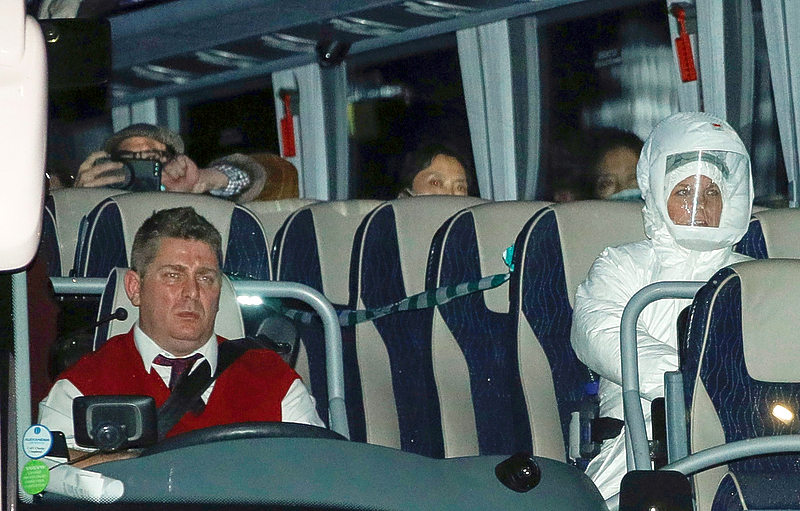A bus transporting passengers who arrived in Britain from China earlier today, travels shortly before arrival at Arrowe Park Hospital, in Wirral, Britain on Friday.
SHANGHAI/BEIJING--The United States ramped up its response to the coronavirus epidemic on Friday, saying it would halt entry to the country of foreign nationals who had been to China within the 14-day incubation period. That measure followed on from an earlier travel warning, that raised China to the same level as Afghanistan and Iraq and angered Beijing.
Originating in the Chinese city of Wuhan, the flu-like virus first identified earlier in January has resulted in 213 deaths in China, according to Chinese health authorities. Wuhan and the surrounding region of Hubei are in virtual quarantine.
More than 9,800 people have been infected in China and more than 130 cases reported in at least 25 other countries and regions, with Russia, Britain, Sweden and Italy all reporting their first cases on Thursday or Friday.
The World Health Organization said on Thursday that the epidemic constituted a public health emergency of international concern, a designation that triggers tighter global containment measures and coordination. "Following the World Health Organization decision, I have today declared that the coronavirus represents a public health emergency in the United States," U.S. Health Secretary Alex Azar said at a news conference on Friday afternoon.
As of Sunday, U.S. citizens who had been in Hubei would undergo compulsory quarantine, he said. Foreign nationals who had traveled in China in the last 14 days would be denied entry, he said, citing the need to relieve pressure on authorities.
The move will likely anger Beijing, which has only just started to mend tattered trade ties with Washington. Earlier on Friday, it criticized the U.S. travel warning. "The World Health Organization urged countries to avoid travel restrictions, but very soon after that, the United States did the opposite," Chinese Foreign Ministry spokeswoman Hua Chunying said. "It's truly mean."
Other countries have also advised citizens to put off non-urgent travel to China or restricted entry to flights to and from China. After reporting its first two cases of the illness, Russia on Friday restricted direct flights to China, its biggest trade partner. Singapore, a major travel hub in Asia, stopped entry of passengers with a recent history of travel to China and also suspended visas for Chinese passport holders.
Italy had also said it is closing air traffic with China. Many airlines have chosen to cancel or reduce flights, with airline crews pressuring carriers to act. U.S. carriers Delta Air Lines and American Airlines became the latest major airlines to suspend flights after the U.S. travel advisory.
Governments around the world are evacuating citizens from Hubei. A plane with 83 British and 27 foreign nationals landed in Britain on Friday, while the United States issued a quarantine order for 195 Americans evacuated to California this week. Japan, with 14 confirmed cases, has sent three flights to bring citizens home.
The virus has an incubation of between one and 14 days, and there are some limited signs it may also be able to spread before any symptoms show.







